Unrealized Reality
Written by David Kemper, directed by Andrew Prowse
Season 4, episode 11
1st UK Transmission Date: 16 December2002
1st US Transmission Date: 23 August 2002
Guest Cast: Raelee Hill (Sikozu), Melissa Jaffer (Noranti), Virginia Hey (Zhaan), Paul Goddard (Stark), Tammy MacIntosh (Jool), Lani Tupu (Bialar Crais), David Franklin (Braca), John Bach (Einstein), Murray Bartlett (DK)
“Space and time are fused, a set of co-ordinates for each required to locate a specific event. Movement at speed through space becomes movement through time. Wormholes bridge space-time, creating a unique ability to navigate.”
Synopsis: John is floating in space outside Moya, waiting for a wormhole to appear. He wants to see it up close and personal, and is especially fascinated with this particular wormhole. It opens and the swallows him up before anybody on Moya can rescue him. He crashes into the midpoint of a branch in the tunnels and finds himself on an iceberg in a small pocket dimension, accompanied by a dapper alien he christens Einstein.
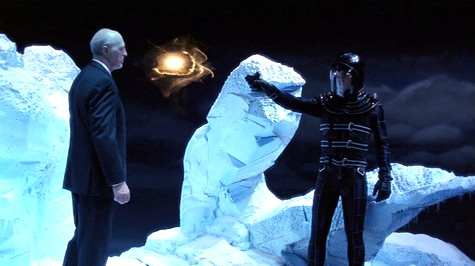
The wormholes are the only point of contact between our universe and one inhabited by an immensely powerful race, unnamed, of which Einstein is a representative. This race augmented some of themselves and these augmented agents entered our universe as ‘The Ancients.’ Their job was to keep an eye on things on our side and make sure that none of the warlike races gained access to the wormhole network. They died, so more are being prepared to cross over to our realm. In the meantime, however, the wormhole network may be vulnerable.
Einstein was responsible for pulling Moya through the wormhole at the end of Season Four. He interrogated Pilot and Noranti then released them when he realised that his real quarry was Crichton. He then kept an eye on Moya, waiting for her to find him. Since John was hanging around for so long by the wormhole at the start of the episode he, was able to locate him and pull him through.
Einstein is not fully augmented, so he can only interact with John in a special halfway point he creates in the wormhole network. It is, however, not stable for long, and requires enormous effort to maintain.
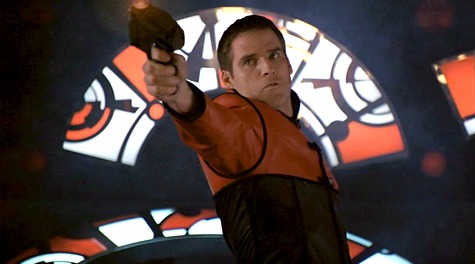
Einstein explains about wormholes… pay attention now, this gets complicated.
A wormhole is not a single passage between two points. You enter a network, with branching forks—one entry point, many possible exit points. Your outward journey is not a problem, but the attempt to return to your original point of departure can cause problems. Unless the person doing the navigating is able to exercise complete mental focus on their destination, it is possible for them to arrive at their destination at a point in time before they originally left. This causes all sorts of weirdness and deposits the traveller in an ‘unrealized reality.’
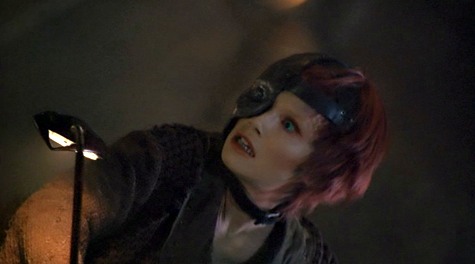
An unrealized reality is not an alternate timeline, nor is it a parallel universe, but some sort of semi-mystical creation that mixes elements of both.
(It is unclear whether the hapless wormhole traveller alters the universe for everyone, or whether they create a wholly new reality, different to their original one, leaving their original one untouched but unreachable by them. The dialogue hints at both interpretations and it’s impossible to say for certain which is the correct one. When John offers to die at the end, it seems he believes the former explanation and is willing to sacrifice himself to protect his friends from the effects of a possible mistake, but Einstein repeatedly refers to unrealised realities as being unique to the traveller—‘it would become your permanent reality’… note the ‘your.’ And in fact, if an unrealized reality were a rewriting of the single universe it would be impossible, surely, for John to pop in and out of various unrealized realities as he does throughout the course of this episode.)
Anyway, as you get close to your original point of departure, the possible points of exit around the one you seek open onto increasingly similar unrealized realities, making it harder to spot the right exit point and increasing the risk of you picking the wrong one and rewriting your universe.
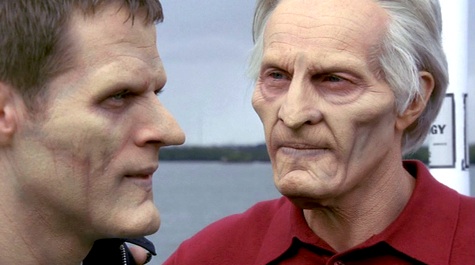
If you exit only a short time before you left, it may be possible to limit the damage by ‘fixing’ the first major change you see. If you’re lucky, time/space can then be turned back to its proper course. Harvey, it appears, knew of this danger. John concludes that Scorpius did too. (But how?) It is unclear whether Nyalla and her pathfinder buddies did—leaving us with the tantalising possibility that the whole of Farscape takes place in an unrealized reality caused by the Pathfinder’s cackhandedness.
So, Einstein sends John to multiple unrealized realities, to teach John… what, exactly? How dangerous he is, or how lost he could become? To be afraid of his knowledge and the damage it could do? Certainly when John admits he is afraid, this convinces Einstein to spare John’s life and leave him free to navigate the wormholes.
In fact, the implication is that John is being released so he can stand in for the dead Ancients, monitoring and protecting the wormhole from incursions until the new band of augmented ancients can cross over and pick up the task again.
Unfortunately John’s attempt to return to Moya goes wrong and he exits the wormhole in orbit around Earth…
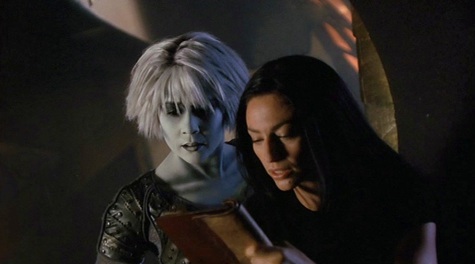
You Can Be More: Aeryn is learning English.
The Ballad Of Aeryn And John: D’Argo finds out about John using the Lacca extract to forget Aeryn. He’s not happy, and John’s unapologetic.
Buckwheat the Sixteenth: Rygel intuits that John is on the verge of a breakthrough that will let them escape the Peackeepers forever.
A Ship, A Living Ship!: Moya’s new filters are blocking the electrostatic surges of Tormented Space, so she is in much better shape.
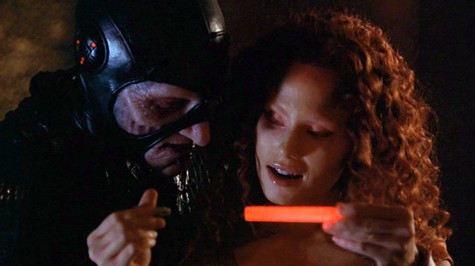
Bobblehead / Nosferatu in Leather: Scorpius has proposed that he and Sikozu become allies. She takes him up on offer, knowing that she will always be less important to Scorpy than John. Scorpy appears to scan Sikozu at one point—what exactly was he looking for, and did he find it? She has worked out a way to reset the coolant rods.
Disney on Acid: John is not Kirk, Spock, Luke (Skywalker), Buck (Rogers), Flash (Gordon) or Arthur Dent (from Hitchiker’s Guide To The Galaxy). He is Dorothy Gale from Kansas.
The Verdict: A benchmark episode, in which we get a huge info-dump on wormholes that only kind of makes sense. It’s typical of Farscape to avoid going for something as simple as alternate timelines or parallel universes—instead we get some kind of metaphysical mashup of weirdness. It doesn’t make the remotest iota of sense, but that’s kind of the point.
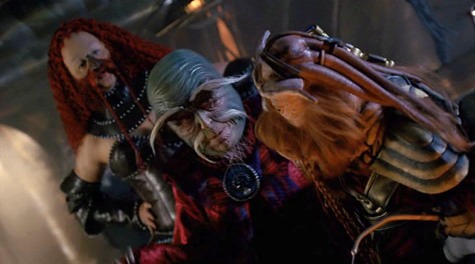
When John is told that navigating wormholes is more of an art than a science, it reflects the refusal of the episode to give us anything as comforting as cod-science technobabble. The nature of unrealized realities is bizarre and inexplicable, and it feels right that it should be beyond our understanding—the universe is too weird to play by a set of rules we could comprehend. (Though it is arguable whether the version of unrealized realities presented by this episode is reflected in the next one, but that’s a discussion for next week…)
The unrealized realities we see all feel tangible and both fun and threatening—from the re-runs of the first episode, to evil Scarran spy Sikozu, hybrid John and his dad, to John the PK traitor aboard a ship of oddly familiar fugitives. They also provide fantastic opportunities for the cast to play alternate versions of established characters, something the show does at least once a season.

First time around I found this episode really confusing and not in a good way; I felt it was a continuation of the kind of muddy writing that blighted the start of the season. But on reflection the confusion engendered here is very different to that engendered by 401-403 because it is very considered and deliberate. I think it really rewards multiple viewings and reflects David Kemper’s determination to make Farscape unlike any other show.
Surprised to find my opinion has wholly changed—I think this is actually one of the best Farscape scripts to date—challenging, clever and original.
Scott K. Andrews has BIG NEWS!










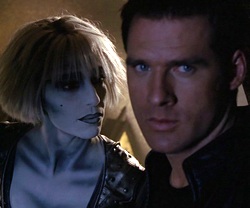
This is the beginning of the massive uptick in quality for season 4 in my opinion. The Earth Trilogy, as I call this and the two proceeding episodes, is one of my favorites of the entire series.
I remember being extremely confused by this episode the first time around and not enjoying it a great deal but when *spoilers* it comes back into play later in the season in the search for Aeryn *spoilers* I went back and watched it again and enjoyed it much more.
I feel like this episode is really plot dense before two very strong character pieces. Plus, the shock of going back to Earth for real, something I didn’t think they’d do until the finale, will always be one of my favorites.
This is a really good episode in its own right–like A Human Reaction and Won’t Get Fooled Again, it uses the weird and the unexpected for purpose, not just for shock effect. A huge weight is being placed on Crichton’s shoulders–he realizes that pursuing wormholes for purely personal reasons has implications beyond his own desire to reach earth, or Scorpius’ desire for a weapon. He has unwittingly turned himself into a threat to… everything.
And I like that this ties back to the concept of the elasticity of time, first introduced back in …Different Destinations. That was one of the darkest episodes to date, and yet this episode reveals that what happened then is only a small glimpse of how fragile time and reality actually are.
It’s great. It especially rewards re-watching (particularly after Bringing Home the Beacon).
What’s interesting from my perspective is that the conclusion to S3 felt like a potential stopping point. But the stated purpose of the series, for Crichton to get back to Earth, is never accomplished. S4 has been, frankly, rather aimless to this point (even comp-ing it a couple episodes to get the gang back together), so it’s curious to me that the writers decided to drop the resolution to that issue mid-season. Plus, they ultimately take it in a direction I didn’t expect (with some moderately-handed social commentary that is very Star Trek in its vision).
What this episode solidifies, for me, is that S4 and, more over-arching, the series knew where it was going and laid those clues out farther in advance than I expected/realized at the time.
Gobbledygook! lol But enjoyable.
A tiny rewrite of mine because one has to maintain complete mental focus to transverse wormholes and John was taking drugs to forget Aeryn at the time thus inhibiting his focus…
The ancient confronted him about his drug taking. It’s part of the reason he ended up at past earth not present Moya.
Other than that loved it and the next EP..
“It was the worst of times, it was the best of times” was always my summation of Season 4. We start out the season with a mishmash of medium to poor quality eps and then Bam! We come to this and the set of Earth episodes that follow, which to my mind are some of the best stuff they’ve ever done.
Loved this ep from the first time I saw it. The bizarreness of the alternate realities, and the mashup of actors and characters were terrific. Watching the various actors adopt the styles of the other actors’ characters was great fun, and the whole underlying concept opened up such entertaining possibilities, as we’ll see in later episodes. Kemper here, and in a couple of his upcoming eps, is truly trying to take TV writing, as it was then conceived, at least on non-premium networks like SciFi, beyond itself. He and the other writers are to be commended for how far they’ve stretched themselves and the writing formulas of standard TV scifi throughout this show’s whole run, but particularly in some of these 2nd half of season 4 eps.